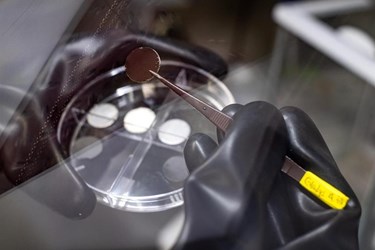RICE University Study: Nano-tubes Answer To Control Li-Ion Battery Decay
 Picture credit: Rice University
Picture credit: Rice University
Nano-Tubes may become the secret method to make Li-Ion Batteries better. A recent research by RICE university published in the advanced materials journal assured that the use of nanotubes film can improve the Lithium Ion batteries’ life and efficiency.
The Nano-tube film stops the development of dendrites which grow inside the battery and slowly destroys it. Dendrite formation can also short circuits the battery and result in fires and explosion(remember Samsung Galaxy Note 7 Batteries and fires). But now it seems that there is a way to delay the battery decay and loss of efficiency.
The Rice lab of chemist James Tour showed thin nano-tube films effectively stop dendrites that grow naturally from unprotected lithium metal anodes in batteries. Over time, these tentacle-like dendrites can pierce the battery’s electrolyte core and reach the cathode, causing the battery to fail.
That problem has both affected use of lithium metal in commercial applications and caused the researchers worldwide to find solutions for it.
Lithium metal charges much faster and holds about 10 times more energy by volume than the lithium-ion electrodes found in just about every electronic device, including mobiles and electric cars.

“What we’ve done turns out to be really easy,” Tour explains. “You just coat a lithium metal foil with a multiwalled carbon nano-tube film. The lithium dopes the nano-tube film, which turns from black to red, and the film in turn diffuses the lithium ions.”
“Physical contact with lithium metal reduces the nano-tube film, but balances it by adding lithium ions,” said Rice postdoctoral researcher Rodrigo Salvatierra, co-lead author of the paper with graduate student Gladys López-Silva. “The ions distribute themselves throughout the nanotube film.”
When the battery is in use, the film discharges stored ions and the underlying lithium anode refills it, maintaining the film’s ability to stop dendrite growth.
The tangled-nanotube film effectively stopped dendrites formation over 580 charge/discharge cycles of a test battery with a sulfurized-carbon cathode the lab developed in previous experiments. The researchers reported the full lithium metal cells retained 99.8 per cent of their coulombic efficiency, the measure of how well electrons move within an electrochemical system.
So till several other new battery technologies, such as graphene-based batteries and saltwater batteries, deliver on their promise to revolutionise battery technology, this development may help give Li-ion batteries a new lease of life.




